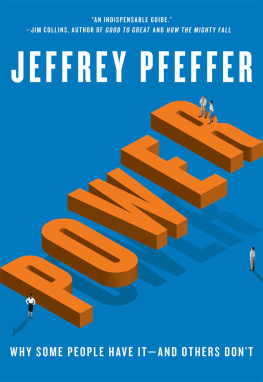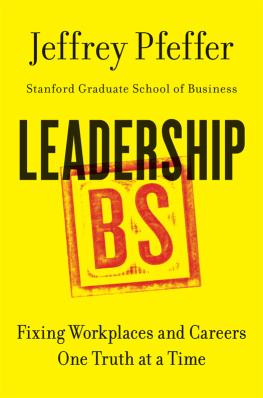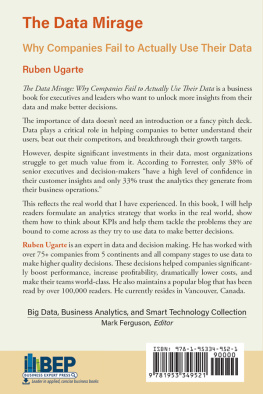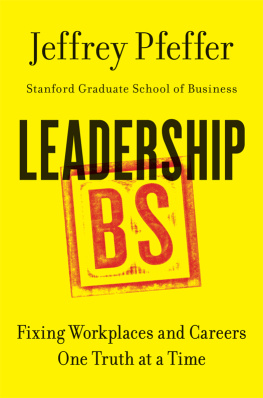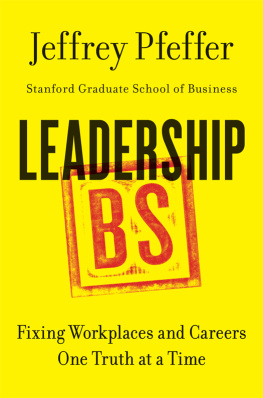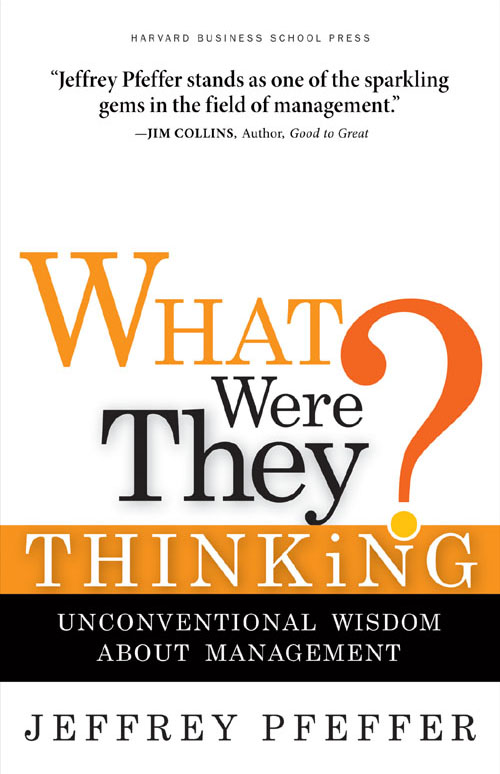Copyright 2007 Jeffrey Pfeffer
All rights reserved
No part of this publication may be reproduced, stored in or introduced into a retrieval system, or transmitted, in any form, or by any means (electronic, mechanical, photocopying, recording, or otherwise), without the prior permission of the publisher. Requests for permission should be directed to permissions, or mailed to Permissions, Harvard Business School Publishing, 60 Harvard Way, Boston, Massachusetts 02163.
First eBook Edition: May 2007
ISBN: 978-1-4221-0312-8
The paper used in this publication meets the requirements of the American National Standard for Permanence of Paper for Publications and Documents in Libraries and Archives Z39.48-1992.
Jeffrey Pfeffer has a rare combination of academic rigor and practical genius. Grounded in research, a revered pioneer in his fieldyet dedicated to helping leaders leadhe stands as one of the sparkling gems in the field of management.
Jim Collins, author, Good to Great, and coauthor, Built to Last
I work with real executives every day. An executive is seldom a God, Devil, Genius, or Idiot; an executive, like the rest of us, is a human being. What Were They Thinking? clearly explains why executives make human mistakes and how these common mistakes can be avoided. You may well think of your own mistakes and answer the question, What was I thinking?
Marshall Goldsmith, executive coach and author, What Got You Here Wont Get You There
A wise book of penetrating intellect wrapped in readable prose that every student, practitioner, and even expert in business must read. If they dont, it is their grand omission.
Jack Valenti, Former President, Motion Picture Association of America
Jeffrey Pfeffer is one of the leading organizational behavior scholars of our time. What Were They Thinking? provides an accessible and insightful integration of theory and pragmatism developed through the thoughtful lens that only Jeff could provide. You will consume this book like a good Chinese dinnerpick what you want to eat from a rich menu, and expect to be hungry for more in a few hours.
Gary Loveman, Chairman, President, and CEO, Harrahs Entertainment, Inc.
I can think of no scholar who has done more than Jeffrey Pfeffer to document how much a companys success depends on how well that company leverages the strength of its human resources. In What Were They Thinking?, Pfeffer provides numerous examples of the companies that get it wrong and the companies that get it right. The result is a theoretically grounded, practical guide for managers on how they can get the most from their people.
Joel M. Podolny, Dean and William S. Beinecke Professor of Management, Yale School of Management
Beyond Managing with Power, beyond Hard Facts, this latest book from Jeffrey Pfeffer takes the principle of learning from the mistakes of others and helps put it into applied practice for business leaders. Combining solid theory with plenty of practical examples, he relates cautionary tales of situations where short-sighted managers have accidentally wandered off the path to success. This helpful book taps into the voice of experience so that we dont all have to learn these lessons the hard way.
David Kelley, Cofounder and Chairman, IDEO
What Were They Thinking? is a collection of snippets, most of which are good common sense. Yet, given how uncommon good common sense can be in corporations, this anthology makes for a very useful reference volume.
Shona L. Brown, SVP Business Operations, Google, and coauthor, Competing on the Edge
Avoiding Common Management Mistakes
LEADERS OF COMPANIES and, for that matter, nonprofits and government agencies and departments face a number of challenges. First of all, in confronting high-stakes situations with substantial economic consequences, senior executives need to make numerous decisions about how to hire and obtain the discretionary effort of employees, how to compete, how to lead, how to deal with various external constituencies and policy issues, how to best manage their own careersbasically, to figure out what works and what to do about a number of important issues. Second, todays managers often need guidance and advice in figuring out what to do but cantor wontspend lots of time reading long treatises on each of these topic domains. And third, if and when companies follow prevailing conventional wisdom, they often discover, if they are attentive, that much of that conventional wisdom is wrong or misleading.
Beginning in January 2003, I have written monthly columns for Business 2.0, a Time Warner business magazine, that appear in the What Works section. The columns have covered a broad range of issues, but have mostly focused on common mistakes I see in how companies manage their people and their business, and also on how to do things better. The columns cover many of the important topics and decisionslike those just describedconfronting organizations of all types. The columns are only about 650 words longa single page. That very tight word limit has precluded me from developing arguments and explanations as thoroughly as might be most helpful, putting in as much data as I would like, providing more examples and context, and, most importantly, having the space to explain not only what works but why it worksthe logic behind the analysis.
Thus, the genesis of this book. I have taken some of those columns, combined some others, and in each instance have redone and expanded the arguments, examples, data, and logic to provide a concise yet comprehensive discussion of what I consider to be a number of the most important management issues and management miscues and triumphs. Because the chapters are each only a few pages, the reader doesnt have to commit to becoming an expert on a particular subject. To provide additional help to people facing the challenge of making important decisions in a welter of conflicting and often incorrect information, the chapters include some endnotes and ideas and data so that for anyone who wants to, it is possible to pursue each topic in further detail.
The chapters are designed to provoke reflection and thought. My objective is, as it is in most of my activities, to educate the reader. Education, as I have come to understand it during more than three decades as a business school professor, is not telling people things they already know nor providing them with ideas that they necessarily already agree with. Education is concerned with helping people see and understand things in different ways, getting them to question previously unquestioned assumptions and ideas, and mostly helping them think and ask questions to uncover some fundamental insights.
Although the chapters cover a wide range of management topics, as I wrote this book I discovered that common ideas appeared in many of the examples. So, to help the reader see what the various discussions of management topics have in common, lets consider the threads that run through most, if not all, of the discussions.
COMMON THEMES
Almost every day, sometimes many times a day, I read an article about some organization or see a company or its leaders in action and exclaim, What were they thinking? It frequently seems as if organizational management is something drawn from a Dilbert cartoon, except with serious consequences for both the companies and their employees. But organizational leaders are hardworking, serious people, often expending enormous amounts of time and effort trying to do a good job. The problem is not one of intelligence or effort. Why do so many companies and their managers do so many things that seem so incorrect? In the spirit of the quality movement that has taught us to look for the root cause of problems so they can be fixed at the source, it is important to see what mind-sets and behaviors underlie many of the difficulties organizations face.



